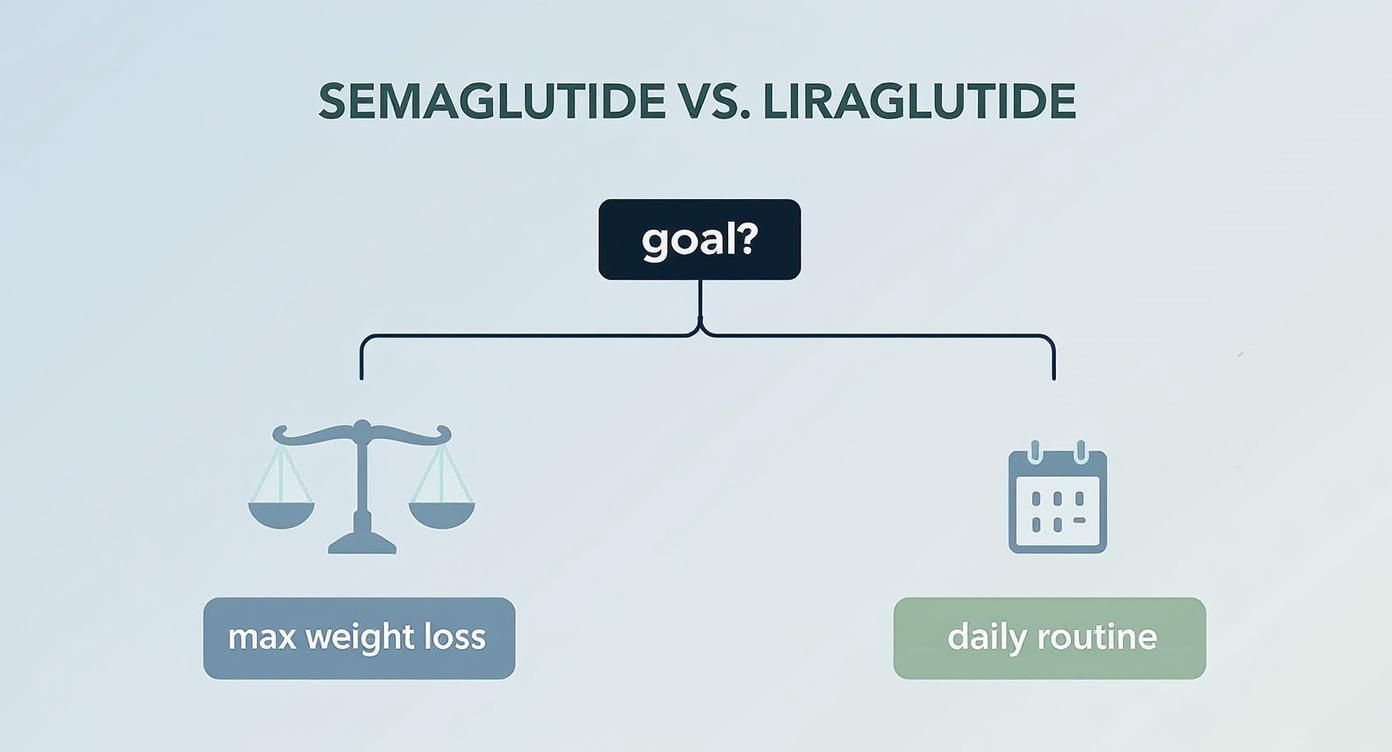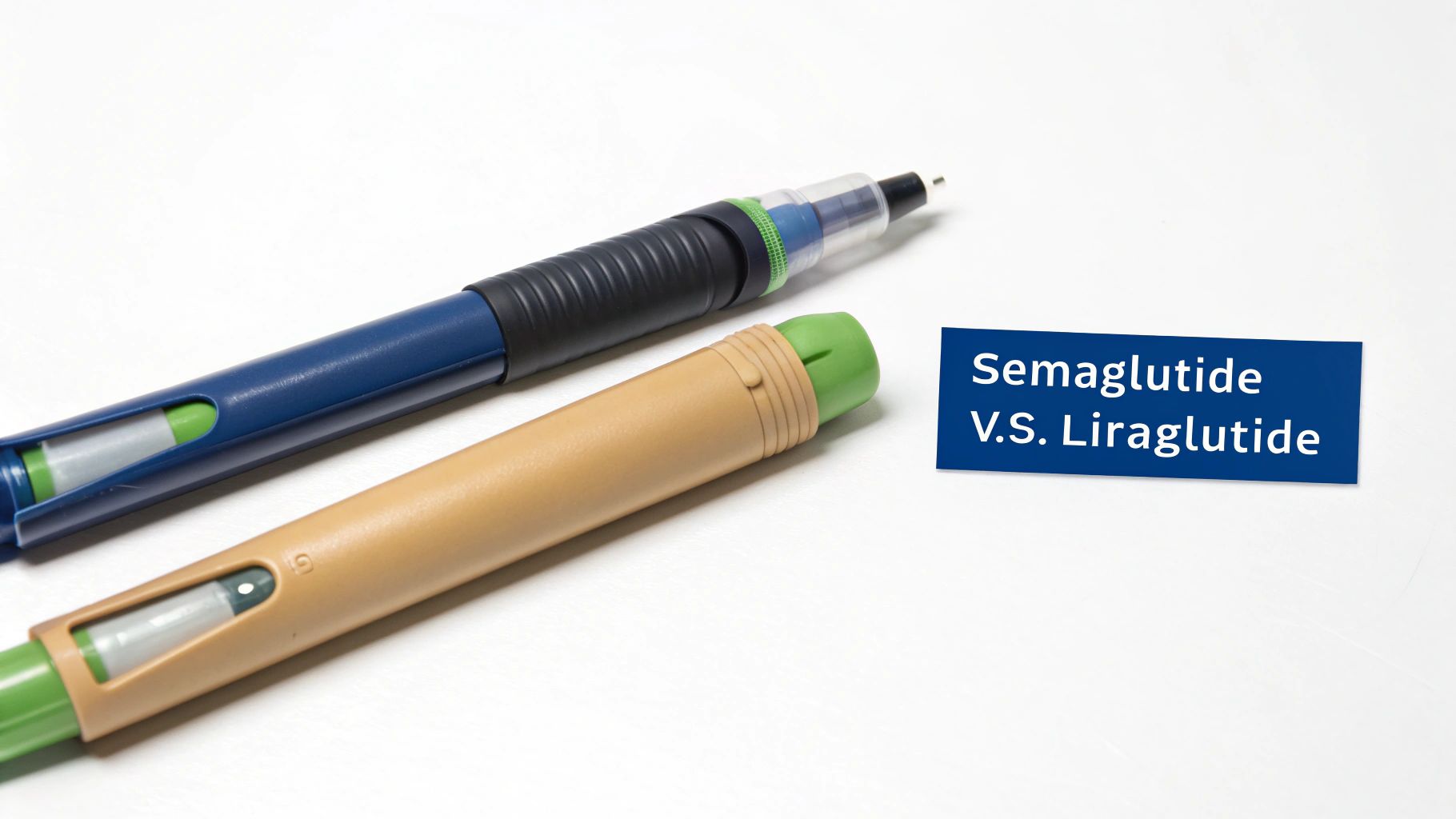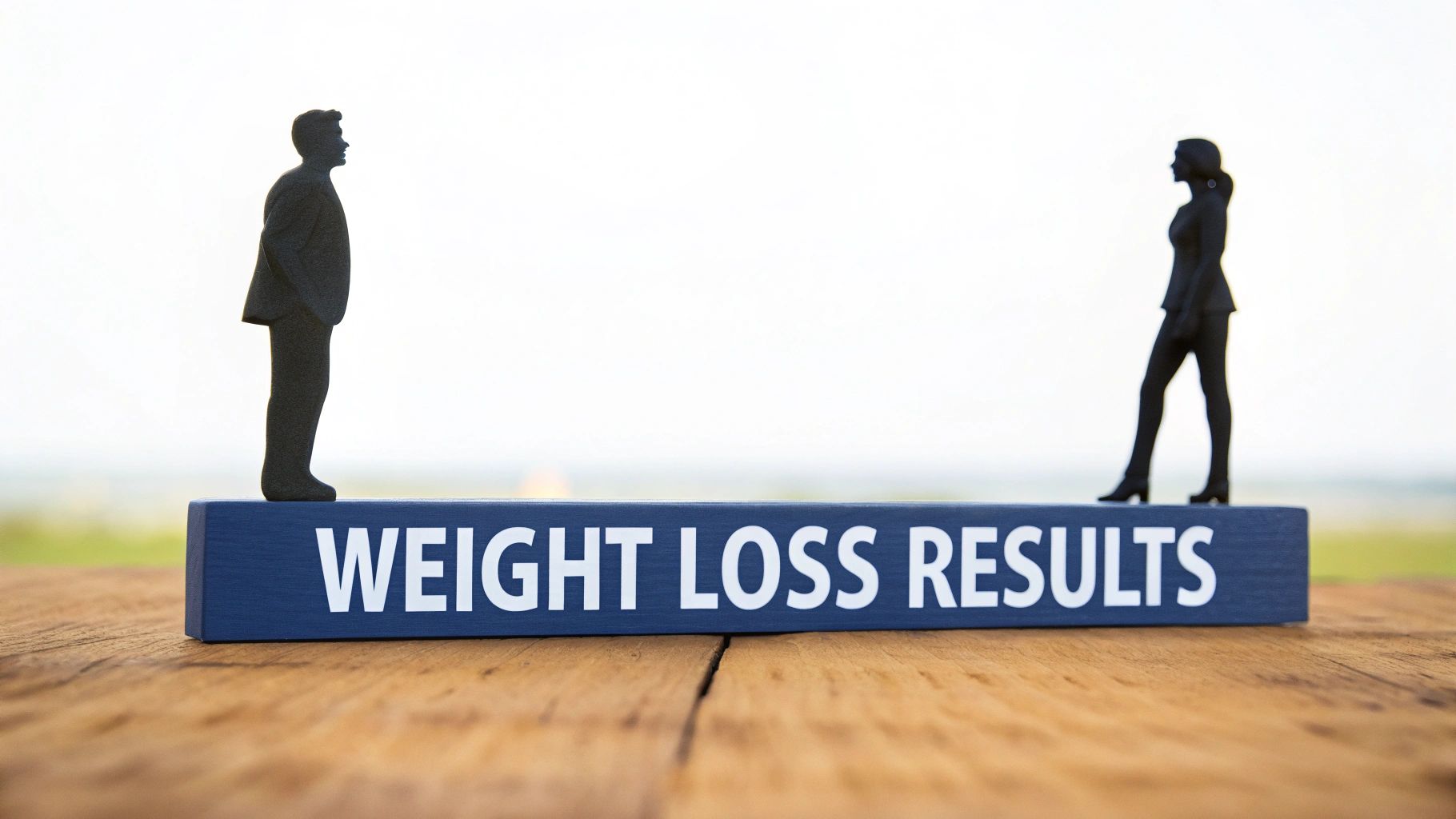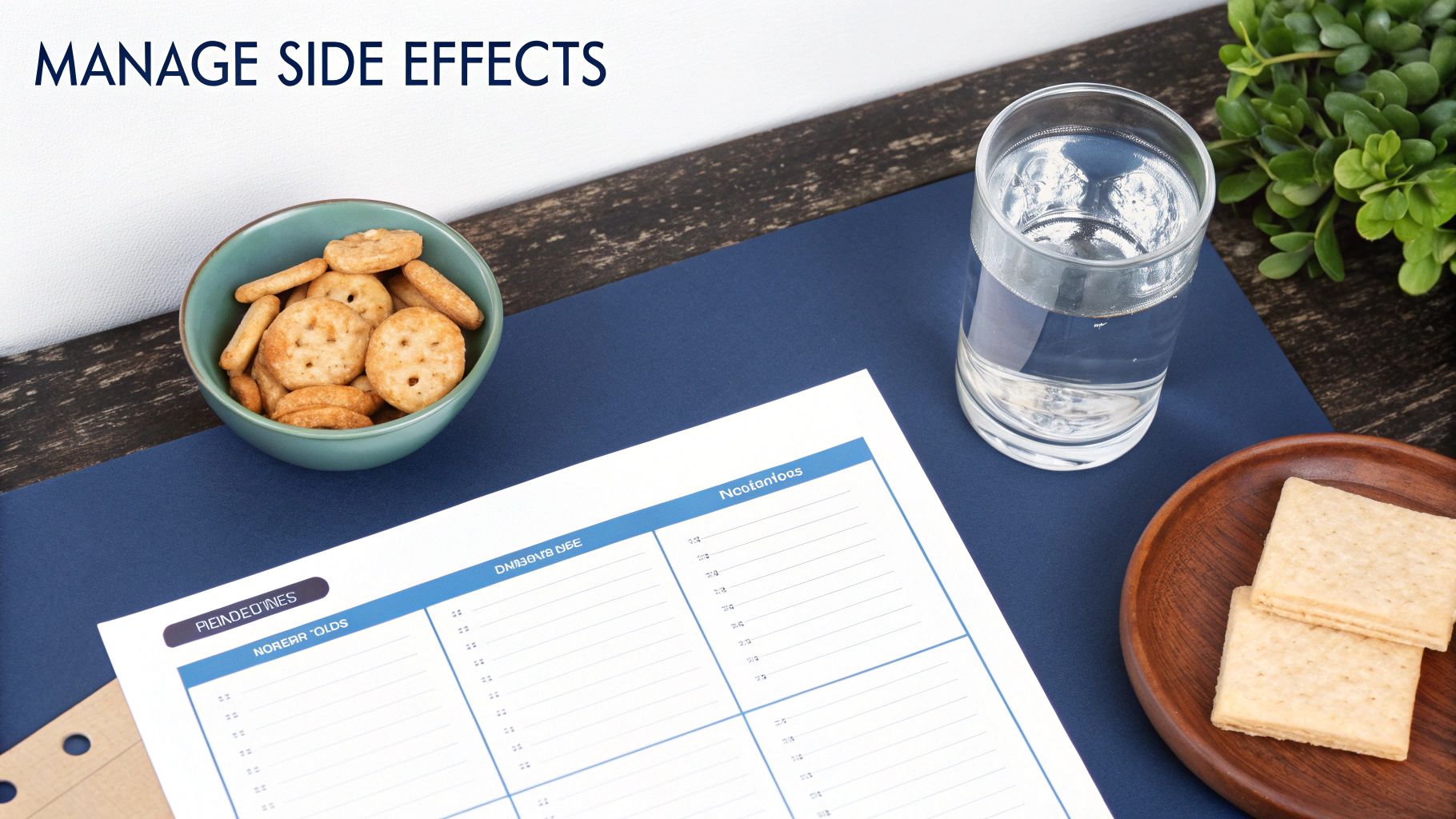
Semaglutide vs Liraglutide: Which Is Right for You?
Share
Deciding between semaglutide and liraglutide is a big step on your wellness journey. While both are powerful GLP-1 medications that help with weight management, there are key differences to consider. In our experience, many people find semaglutide leads to more significant weight loss and appreciate the convenience of a once-weekly injection. On the other hand, liraglutide is taken daily.
Choosing Between Semaglutide and Liraglutide
When you're mapping out a long-term plan for managing your weight, understanding your options is essential. Both semaglutide and liraglutide are part of a family of medications called GLP-1 receptor agonists. They work by mimicking a gut hormone that tells your brain you're full and slows down how quickly your stomach empties. The result? You feel satisfied with less food, making it easier to manage your weight for the long term.
If you're curious about the science, our guide on how GLP-1 medications work for weight loss breaks it all down in a clear, simple way.
These treatments have become a cornerstone in modern weight management. The market for these drugs was valued at around USD 15.19 billion and is expected to soar to USD 35.01 billion by 2032. This isn't just a trend; it's a major shift in how we approach healthy living and longevity.
Semaglutide vs Liraglutide At-a-Glance
To make things easier, here’s a quick table to show you the main differences side-by-side.
| Feature | Semaglutide | Liraglutide |
|---|---|---|
| Dosing Frequency | Once a week | Once a day |
| Average Weight Loss | 10-15% of body weight | 5-7% of body weight |
| Administration | Subcutaneous injection | Subcutaneous injection |
| Common Side Effects | Nausea, mild GI issues | Nausea, mild GI issues |
This table lays out the core trade-off pretty clearly. Semaglutide typically delivers more dramatic weight loss results with a much less frequent dosing schedule. Liraglutide, while still effective, requires a daily commitment that some people might find easier to build into their routine.
This infographic can also help you visualize which option might be a better fit based on what you're prioritizing.

As you can see, it often boils down to a personal choice between convenience and the degree of weight loss you're targeting.
Expert Insight: Your final decision should always come after a thorough chat with your healthcare provider. It's about balancing your personal health goals, your lifestyle, and what feels sustainable for you in the long run.
Ultimately, both medications are incredible tools for reaching a healthier weight and building a lifestyle that supports your long-term well-being. The "right" choice is simply the one that fits seamlessly into your life.
How GLP-1 Medications Fit Into Your Weight Management Plan

Before diving into a direct comparison of semaglutide vs. liraglutide, it’s really helpful to get a feel for how these medications actually work. They aren't magic pills, but powerful tools that work with your body's natural systems to support your weight management goals.
Both belong to a class of drugs known as GLP-1 receptor agonists. That sounds technical, but the concept is straightforward. They imitate a hormone your gut naturally releases after a meal, called glucagon-like peptide-1 (GLP-1), which is a key player in managing appetite and blood sugar. Think of these medications as amplifying your body's "I'm full" signal.
The Science Behind Feeling Satisfied
When you take a GLP-1 medication, it targets receptors in your brain that regulate hunger. This helps quiet the "food noise"—those persistent cravings and thoughts about eating that can derail even the best intentions. Suddenly, you're more in control.
But that's only half the story. The medication also slows down gastric emptying, which is just the technical term for how quickly food moves out of your stomach. By making you feel physically fuller for longer after you eat, it becomes much easier to be satisfied with smaller portions.
The real power of GLP-1s lies in this two-pronged attack: they tackle hunger both mentally in the brain and physically in the stomach. This combination helps reset your body’s appetite regulation, making sustainable weight loss feel less like a constant battle.
By helping your body's metabolic processes run more smoothly, these treatments become a foundational piece of a long-term health strategy, not just a short-term fix for hunger.
A Closer Look at the Mechanism
Beyond just making you feel full, GLP-1s also help stabilize your blood sugar by prompting your pancreas to release insulin at the right times. This metabolic boost is a huge plus for your overall wellness and can lead to more consistent energy levels—a big help when you're trying to be more active.
Here’s a simple breakdown of what these medications do:
- Appetite Regulation: They send clear signals to your brain's satiety center, dialing down the urge to eat when your body doesn't need fuel.
- Slowed Digestion: They keep food in your stomach longer, extending that comfortable feeling of fullness after meals.
- Blood Sugar Support: They promote stable glucose levels, which helps reduce cravings for high-sugar snacks and prevents those dreaded energy slumps.
This well-rounded approach is why so many people are finding success. If you're curious about other options, our guide to prescription weight loss medication offers a great overview. For a deeper dive into the science, you can continue understanding GLP-1 medications.
When you understand the "how," you can feel more confident that you're making a choice that aligns with your body's biology to reach your health goals. Ready to see if a GLP-1 is right for you? Take our quiz to get started.
Comparing Weight Loss Efficacy and Real-World Results
https://www.youtube.com/embed/5fx5W1OtVE8
When you're looking at GLP-1 medications for weight loss, the biggest question is usually the simplest: which one works better? Both semaglutide and liraglutide are powerful tools, but research consistently shows a clear winner when it comes to sheer potency. This is where the semaglutide vs liraglutide showdown really matters.
The data from study after study points to semaglutide as the more effective option for significant weight loss. For many people, this simple fact is the deciding factor that best aligns with their health goals.
A Look at the Numbers
When we dive into the clinical evidence, the difference in results is striking. People taking semaglutide typically see a total body weight loss somewhere in the range of 10% to 15%. In contrast, those on liraglutide usually experience a weight loss of around 5% to 7%.
While any progress is good progress, the higher percentage linked to semaglutide can make a massive difference in your health. These aren't just abstract numbers; they translate into real, tangible changes you can see and feel every day.
Key Takeaway: On average, semaglutide delivers about double the weight loss compared to liraglutide. That’s a critical distinction if you're aiming for substantial, life-changing results.
This superior efficacy is a huge reason why many people, after talking with their healthcare provider, choose the once-weekly semaglutide treatment to help them hit their targets.
What This Means for You in Practice
Percentages can feel a bit fuzzy, so let's put them into a real-world context to see the impact.
Imagine someone who weighs 200 pounds and wants to get to a healthier weight to feel more energetic and take pressure off their joints.
- With Liraglutide: A 5-7% weight loss would mean shedding between 10 and 14 pounds. That's a solid start and can certainly lead to positive health benefits.
- With Semaglutide: A 10-15% weight loss would result in losing between 20 and 30 pounds. This much larger reduction can have a far greater impact on everything from joint health and mobility to metabolic function.
As you can see, the difference between losing 14 pounds and losing 30 pounds is huge. It can be the difference that helps you reach a major milestone, whether that's fitting back into your favorite clothes or just feeling more comfortable in your own skin. To see what this looks like for real people, check out these inspiring semaglutide before and after stories.
Why Is Semaglutide More Potent?
Semaglutide's extra punch comes down to its molecular design and how it works in your body. It has a much longer half-life, which simply means it stays active in your system for a full week. This sustained action keeps your appetite and hunger signals in check far more consistently than the daily action of liraglutide.
That longer duration isn't just about a more convenient dosing schedule; it's a key reason why it delivers better weight loss results.
Clinical trials have shown that semaglutide can reduce body weight by approximately 10-15%, easily outperforming liraglutide, which typically achieves around 5-7% weight loss. It's no surprise that people struggling with their weight are increasingly choosing semaglutide, not just for the results but also for the convenience of a once-weekly injection versus a daily one.
Ultimately, choosing between these two medications often comes down to your personal goals. If your aim is to achieve the most significant weight loss possible to transform your long-term health, the evidence points overwhelmingly toward semaglutide as the more powerful choice.
Understanding Dosing Schedules and Lifestyle Fit

Any wellness plan is only as good as your ability to stick with it. When you’re weighing semaglutide vs. liraglutide, the dosing schedule is one of the biggest practical differences you'll encounter, and it's a huge factor in what will feel sustainable for you.
This isn't just a matter of convenience. It's about building a routine that feels like a natural part of your life, not a chore. Long-term success with weight management is all about consistency, so choosing a schedule you can genuinely live with is one of the most critical decisions you'll make.
The Weekly Rhythm of Semaglutide
Semaglutide is a once-weekly injection. Many people love this "set it and forget it" approach because it’s so straightforward.
If you have a hectic or unpredictable schedule, a weekly dose takes one more thing off your plate. You can pick a day—say, Sunday night—to do the injection, and you're done for the next seven days. This simplicity helps reduce the mental energy spent managing a medication. Our guide to the semaglutide dosing schedule breaks down the typical titration process in more detail.
The Daily Habit of Liraglutide
Liraglutide, on the other hand, requires a daily injection. While that might sound like a lot more effort, some people actually prefer it. Why? Because it builds a routine.
By tying a quick daily injection to an existing habit, like brushing your teeth or having your morning coffee, it can become second nature. For individuals who feel more grounded and in control with a daily touchpoint, the liraglutide schedule offers a consistent, reassuring anchor in their health journey. It’s a small, daily reminder of the commitment you've made to yourself.
The best schedule is the one you don't have to force. Think about your personality: Do you prefer to handle tasks once and be done, or do you find comfort and consistency in a daily ritual?
Making Your Choice Work for You
No matter which path you choose, building supportive habits around your medication is what truly makes it effective. Think of the medication as a powerful tool; pairing it with other healthy choices is how you get the best results.
Here are a few practical tips to help you stay on track:
- Set Digital Reminders: Use your phone’s calendar or an app. For a weekly dose, set an alarm for the same day and time each week. For a daily one, a recurring notification is perfect.
- Link it to a Habit: This is called "habit stacking." Connect your injection time to something you never forget, like, "Right after I put my work laptop away, I'll take my medication."
- Plan Your Nutrition: A steady medication routine is much more effective when paired with a consistent eating plan. Using effective meal planning tools can make a huge difference in creating a sustainable lifestyle.
- Track Your Progress: Keep a simple journal. Note your dose, how you feel, and any non-scale victories—more energy, better-fitting clothes. This is great for motivation.
Ultimately, the weekly vs. daily debate comes down to what fits your life. By being honest about your lifestyle, habits, and personality, you can choose the medication that not only works but also feels like a seamless part of your routine. That alignment is the real secret to turning a short-term plan into lasting success.
Navigating Potential Side Effects and Safety
Anytime you consider a new medication, it's important to look at the whole picture—and that absolutely includes potential side effects. When we're comparing semaglutide vs. liraglutide, it’s helpful to remember that they work in a very similar way, so it's no surprise that their safety profiles are also quite alike.
The good news? For most people, any side effects that do pop up are mild and don't stick around for long. They're most common right when you start the medication or just after your dose is increased.
Common Side Effects and How to Manage Them
The side effects people report most often are gastrointestinal issues. This makes perfect sense when you think about how these drugs work; they slow down your digestion to help you feel fuller for longer.
You might experience:
- Nausea: This is the big one. It's the most common complaint, but it almost always fades as your body gets used to the medication.
- Constipation or Diarrhea: When you change the speed of your digestive system, it can sometimes swing one way or the other.
- Mild Abdominal Discomfort: A bit of bloating or some light cramping can also happen.
While these don’t sound like fun, they are usually manageable and tend to lessen over time. The gradual dose increase that your provider will walk you through is specifically designed to minimize this exact discomfort and give your body a chance to adapt smoothly.
Practical Tip: To head off nausea, try eating smaller, more frequent meals instead of three big ones. Steering clear of greasy or super-rich foods and sipping water all day can also make a world of difference.
Staying hydrated and eating slowly are simple but effective habits. They help your digestive system adjust more comfortably as it gets used to the medication doing its job.
The Importance of a Slow and Steady Approach
At Blue Haven Rx, your health and comfort are everything. That’s why our medical team always starts patients on a low dose of their prescribed GLP-1 and increases it very gradually over several weeks or even months.
This careful "titration" process isn't just a safety protocol—it's about making the entire experience as positive as possible. By giving your body plenty of time to adjust at each step, we can dramatically reduce the likelihood of disruptive side effects. Think of it as a marathon, not a sprint. This thoughtful approach helps ensure you can stick with the treatment and hit your long-term goals.
Understanding the Broader Context
While it's important to know about individual side effects, it also helps to see the bigger picture. Liraglutide has been a trusted tool for managing both weight and type 2 diabetes for years, and its track record speaks for itself.
The demand for effective treatments is only growing. As of 2022, over 650 million adults worldwide were estimated to be obese, and that number continues to climb. With projections suggesting another 167 million people may become obese by 2025, having reliable options is more critical than ever. Learn more about the market dynamics of these medications.
Both semaglutide and liraglutide have been studied extensively. When used under a doctor’s supervision, they are considered effective for many people. Serious side effects are rare, but they are possible, which is why having an open line of communication with your healthcare provider is key. They're your partner in this and will help you navigate any concerns.
Your journey to better health is a partnership, and our team is here to support you every step of the way. If you’re ready to see what a personalized plan could look like for you, take our quick quiz to get started.
How to Get Started with Blue Haven Rx

Now that you understand the key differences between semaglutide and liraglutide, you might be wondering what's next. We've designed the process at Blue Haven Rx to be as simple and supportive as possible. Our telehealth platform is built around your convenience, privacy, and long-term success.
Everything happens right from the comfort of your home. Forget about crowded waiting rooms or trying to fit an appointment into a packed schedule. We’ve created a direct path to getting the personalized care you deserve.
Your First Step: A Simple Health Quiz
It all begins with our quick, confidential health quiz. Think of it less like a test and more like the start of a conversation. Your answers give us a clear picture of your health history, your lifestyle, and your weight loss goals.
This is our way of seeing if a GLP-1 medication is a good potential fit for you. It only takes a few minutes and lays the groundwork for your entire personalized plan.
Connecting with a Healthcare Professional
After the quiz, you'll connect with a licensed U.S. healthcare provider for a virtual consultation. This is your dedicated time to discuss your goals in a private, one-on-one setting.
During this call, your provider will:
- Review your health history to make sure the treatment is safe and appropriate for you.
- Talk through your wellness goals to truly understand what you want to achieve.
- Answer any questions you have about semaglutide, liraglutide, or anything else.
- Map out your personalized plan and, if appropriate, write your prescription.
Our entire telehealth model is built on making expert medical advice accessible and stress-free. We connect you with dedicated professionals who want to help you achieve lasting results.
This isn't about one-size-fits-all solutions. It's about creating a treatment plan that fits your body and your life. Your provider becomes your partner, guiding you with genuine expertise every step of the way.
We're here to help you write a new chapter in your health story. To learn more and see if you qualify, take the first step with our quick online assessment today.
Got Questions? We’ve Got Answers.
As you dig into the details of semaglutide versus liraglutide, you're bound to have questions. That’s a good thing. Getting clear, straightforward answers is the best way to feel confident about the path you choose for your health journey. We’ve compiled some of the most common questions we hear to help you get started.
Our aim is to give you the information you need to have a meaningful conversation with your provider. This isn't about just picking a drug; it's about building a sustainable plan that actually fits your life.
Can I Switch from Liraglutide to Semaglutide?
Yes, switching from liraglutide to semaglutide is definitely possible, but it’s a process that absolutely must be managed by a licensed healthcare provider. You can't just stop one and start the other. Your provider will map out a specific transition plan to help your body adjust safely.
This usually involves a "washout" period—a short break after you stop liraglutide before starting semaglutide. From there, they'll start you on a low dose of semaglutide and gradually increase it to minimize potential side effects. Never try to switch these medications on your own. Professional guidance is non-negotiable for your safety and to make sure the treatment works.
How Long Will I Need to Take These Medications?
For most people, GLP-1 medications like semaglutide and liraglutide are long-term commitments. That’s because managing weight is often a long-term journey, and these treatments are designed to help you not just lose the weight, but keep it off. It’s less like a temporary diet pill and more like a long-term tool for supporting your health.
The right duration for you is a conversation you'll have with your provider. They'll track your progress, check in on your health, and work with you to decide how the medication fits into your bigger picture.
Remember, the goal here is sustainable health. These medications help regulate your body's natural systems, and stopping them often leads to regaining the weight you worked so hard to lose.
What Lifestyle Changes Will Help Me Get the Best Results?
Think of GLP-1 medications as a powerful booster, not a magic bullet. They work best when paired with a healthy lifestyle. While the medication helps a ton with appetite and cravings, your daily habits are what will truly lock in your results for the long haul.
Here are a few practical habits to build into your routine:
- Eat a Balanced Diet: Focus on whole foods. Lean proteins, vegetables packed with fiber, and healthy fats will keep you feeling full and properly fueled.
- Get Regular Physical Activity: Find movement you actually enjoy—walking, swimming, lifting weights, dancing. Consistent exercise is fantastic for your metabolism and overall well-being.
- Stay Hydrated: Drinking enough water is key. It helps manage potential side effects like constipation and just keeps your body running smoothly.
When you combine these habits with your medication, you create a powerful synergy that makes achieving your health goals so much more attainable.
Ready to see what a personalized weight management plan could look like for you? The team at Blue Haven Rx is here to help. Take our quick quiz to see if you qualify and start your journey today.